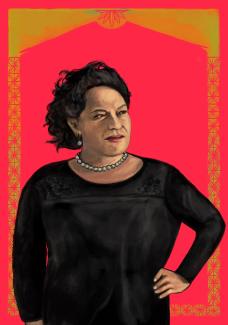A conversation with Joey S Joleen Mataele from the Tonga Leitis’ Association.
Interviewed and edited by Rochelle Jones
Introduction by Tenzin Dolker
Illustrations by Anga’aefonu (Fonu)
Introduction
Over the last few years we spoke to a number of incredible feminist activists from different parts of the world. Sharing deep insights about the past and present state of feminist organizing and resourcing, they reflected on the complex, multi-sourced, and often invisible ways that movements resource their work. We discussed forms of resourcing that are autonomous or outside philanthropic and governmental models, which we have been calling, “autonomous resourcing.”
Joey, as known by her activist community, shares how much of her feminist organizing over so much of her life has been unpaid labour of love; love for friends, love for the trans community, and love for justice. She reflects: “If we had to name or put a cost to the work that we have done and we have achieved, none of this funding has even reached the amount of work that we have done. Most of these things come from our own pockets.”
The conversation with Joey was part of a series of conversations. The first two conversations we shared was with queer activist, Chayanika Shah, who is based in Mumbai, and sex workers’ rights activist, Dame Catherine Healy in New Zealand. Third in the series is with Joey S Joleen Mataele, a transgender activist from the Tonga Leitis’ Association (TLA) in the Kingdom of Tonga, whose work has been highlighted in this feature documentary, Leitis in Waiting.
Joey recollects, “Seventeen years before we started getting funding, the work of the Tonga Leitis' Association was solely funded by the Miss Galaxy pageant and running the office, you know, and all that. We actually had to work from my house, really."
"Autonomous resourcing", as Luti, an LGBT activist from Costa Rica declared, “is the origin of our feminist organizing” at an online skillshare exchange on the topic last year. The origins of the Tonga Leitis’ Association also began with autonomous resources, generated with the Miss Galaxy pageant, which continues to this day.
Below is a conversation between Rochelle and Joey, edited for length and clarity.
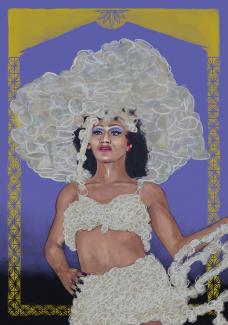
RJ: What are the main issues the Tonga Leitis’ Association organizes around?
JM: The work we do is based on human rights and HIV prevention. Our activism is for the human rights of transgender women and men. We advocate for lesbian and bisexual women, also. We have been able to work with the LBT women's community which was never an open topic years ago... you know, if we say 20 years ago, they were always in the closet, they were never comfortable to come out. We started building an environment for them to come forward and join us, and through the work that we do by advocating and being their voices in public, it turned out that they heard us and then through our Miss Galaxy pageant, we advocated for the rights of all LGBTQI, and so it made them more comfortable.
Our work is not just limited to LBT women - we also advocate for heterosexual women and we support the movement for women's rights. We have been there since day one, supporting all the NGOs that concern women, advocating for women’s rights in parliament, campaigning for women candidates… we've always been there to help in any way we can - especially protecting the rights of women, we are always at the forefront fighting for them.
When we started TLA in 1992, part of our goals was to re-educate our school dropouts. Those kids that have been chased away from their homes or those that were not able to finish their schooling - because you're actually talking to one, I'm one of those people. Unfortunately, the scholarship didn't come to me (laughs).
I educated myself on my own. I left school when I was 14-years-old. I just couldn't handle that, you know, pain from the physical abuse, the verbal abuse in school. And so I just couldn't be bothered. I've been self taught.
RJ: How do you resource your work?
JM: I think right after that, when we started, none of us were able to write proposals, and we had a hard time because every single time we applied for funding, it was always turned down because of the language we were using. You know, it's not a donor language. It took us about 17 years to finally, finally get approved for one donor. Tonga’s National AIDS Council (NAC) was established in 1988. When Tonga joined other heads of Health Ministries throughout the Pacific in a collaborative effort to combat sexually transmitted infections and HIV, some funding came from the Australian government and the Pacific Community, formerly the South Pacific Commission. It took that project for us to start learning how to write a proper proposal.
Since we started in 1992 up to this year, we've been able to give away 62 scholarships. The first 32 scholarships were funded from our Miss Galaxy pageant. It funded the running of the office, but still no core funding to pay staff. Now we've been able to secure funding to pay staff to run the office properly and the Rei Foundation in Japan funds our school scholarships now. We've also been able to secure funding from the UNDP-Global Fund Partnership on HIV awareness programs and the rights of LGBT people living with HIV. They've been able to fund most of our projects, especially the HIV awareness programs, but it's all project funding. We've been able to get core funding lately; we were very fortunate that we had funding from the Give Out Foundation and through working with the Commonwealth Equality Network. We've also just started working with the International Trans Fund on one of our projects, which is called The Leitis in Waiting Pacific Equality Campaign, to share our documentary with all of the Pacific Islands, and especially the seven countries that still haven't decriminalised homosexuality.
RJ: Tell me more about the Miss Galaxy pageant.
JM: Seventeen years before we started getting funding, the work of the TLA, including the office, was solely funded by the Miss Galaxy pageant. We actually had to work from my house, really. The first five years we had a small corner office that was funded by Her Royal Highness Princess Pilolevu in one of her offices. Then when the organization started getting bigger, and we had a few other volunteers, we decided to work from my house. We had a warehouse in the back, and our office and we did everything from there for almost 17 years.
When we finally got funding to start, we were able to fund an office and rent a space, in 2014, I think. So the money that we get from Miss Galaxy helps a lot for the expenditures for the office and for the drop-in centre residents who live there.
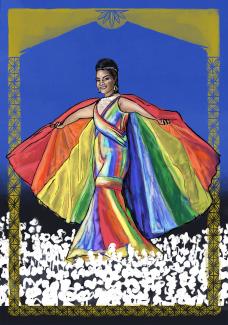
RJ: How do you raise the money through Miss Galaxy? Talk me through that.
JM: We sell tickets. We advertise through social media, radio, TV, and then we hold the Miss Galaxy pageant in one of the biggest halls here in Tonga that caters to about 2000 people a night. It's actually a platform that we use to advocate. This is when we put out our voices and we decide on a theme that we change every year. With the contestants, one of the categories is that they have to do an item that concerns them personally, that links to them, whether it's domestic violence or abuse or something else .
RJ: It's like storytelling?
JM: Yes, like storytelling. So you can sing, you can dance, you can do whatever. As long as it goes with the theme. Another category is condom creation. Because of the work that we do on HIV, we used all of the expired condoms from the hospital to design the dresses and head gear. This category promotes the importance of protecting yourself from being at risk and vulnerable to being infected with HIV/STIs. One thing I love about this category is the designs are just outrageous! Those categories will always stay in every year, the other categories we change all the time. This year, we had rainbow creation, which is because it coincided with Pride Month.

The pageant runs for two nights, but it's a week-long program. It starts on a Sunday, in which all contestants and TLA members will attend Mass at the Catholic church or whatever church they decide to go to that year. Then from there, on Monday we do the Hu’atolitoli prison visitation. Every contestant will take gifts and present them to the prisoners, and they will have a session of prayers, music and entertainment for prisoners. After that, we also present a collection of donations of about 1000 dollars to the centre from the contestants and TLA members. The next day, we have the contestants visit the Alonga disability centre and they take gifts and money and entertain the disabled children and elderly. The following day is capacity-building and HIV training for them, and on the same day, they go into the pediatric ward and present gifts to children.
RJ: So it's really bringing the whole community together, this event, isn't it? It's massive.
JM: Yes. From there, they have a day out in one of the islands that sponsors them to come, and we take them out for a break and then they do their rehearsals over there. The last two nights are the pageant nights. We always aim for about 10-15 finalists from everywhere in Tonga. Usually there are some villages who do their own little thing and they choose one to come and represent.
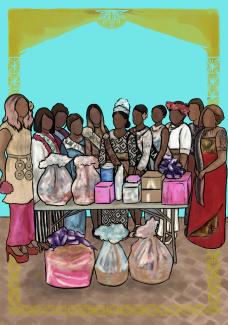
RJ: Do you pack the hall on both nights? Is it at capacity?
JM: We actually have to stop people outside! The security has to stop them, because there's no space to walk. It is always full every single time. In the beginning, we did it at my father's hotel, Joe’s Tropicana Hotel, and we filled up the place with about 500 people that could fit inside.

People were still lining up outside, so after two years there, we had to move. There was a lot of demand for it, so we moved from there to the International Dateline Hotel, and then after three years there, we had a fallout with one of the ministers who was a chairperson for the board of the hotel. He was very church-y all that, and his religion really went against us holding the pageant over there. So we moved from there to another big hall and from there, the demand was just too much. We went and asked our patron to see the Queen – Her Majesty now, she was Princess Nanasi then – because she was the chairperson for the Queen Salote Memorial Hall. So, she said "Yes, go ahead", and we moved to the Queen Salote Memorial Hall and we've been there since 1997.
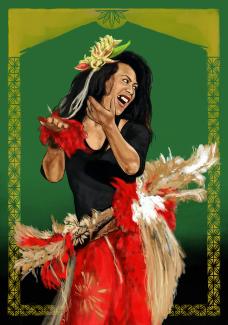
RJ: You said the Miss Galaxy pageant funded your organisation's work for 17 years, and then you started to get some funding externally. Are there any lessons that you've learned from that kind of resourcing? How do you balance that with all the other work that you're doing at the same time?
JM: Right after a Miss Galaxy, towards the end of the year, we would sit down and plan. Then we would evaluate the Miss Galaxy that year, what needs to be improved and then after that we set the date, we do the letters asking for sponsors and we deliver them in November. By January, that's when everybody starts coming back into town - some of the people that return to the outer islands come back in January to their normal jobs and then we start meeting and we have to concentrate on other projects that we run. At the same time, we have to try to find time for our own family... which is hardly any by the time we get home (laughs). It was hard for me at the same time, when we started the Pacific Sexual Gender Diversity Network – that actually doubled the work that I used to do. Who had time for your families? Because most of the time you were travelling in meetings and lobbying in countries.

RJ: Since you started getting funding externally, has it made it easier in terms of your other projects? You've got more money?
JM: It is a lot easier. But it's still not enough. We only have one program coordinator and two other paid staff and I'm not paid at all. We have a coordinator and the two assistants, and they share the cream of the pie... But we all have to chip in somehow to the running of the office and feeding everyone that's living in the drop-in centre. It is in the same building and we have rooms for the seven people living there that we support – clothing and all. This includes two elderly members – it’s one of TLA’s dreams to be able to afford a piece of land so that we can build a proper centre to cater for our own community and for the benefit of our elderly LGBT.
RJ: Do you think you have the resources you need to do your work? If you were to receive any kind of funding that would be most useful for your work, then what would it look like?
JM: No, we don't. Okay, I'll be very honest. We don't even have the right resources for the work that we do. If we had to name or put a cost to the work that we have done and we have achieved, none of this funding has even reached the amount of work that we have done. Most of these things come from our own pockets. Even housing and taking care of the people that live in our drop-in centre. That costs money and time – and most of us are trying to work in other places to fund some of the work that we do, let alone supporting our own families. We would really appreciate more core funding.
One of the projects that we would love to do is aging. I know a lot of people do not think about it. But there is a concern because we've had a couple of people living in our drop-in centre and they've died under our care. These are elderly LGBT people. And it hits us badly because we thought... "Hey, we've been doing all this work, but how about us? We will end up like this, who's gonna look after us?" We need to take care... that our self-care and well-being needs are taken care of. We can do so much – we can shout as much as we can, we can run down the street and fight whoever we want. But at the end of the day, who's going to take care of you? That is one thing that we thought we need to put together. We would love to build a proper retreat centre that has an office, conference room, housing, and clinic for the elderly people. There's no home for the elderly here in Tonga. And that is one thing that is really dear to our heart now that we have to provide. It's a reality and especially if you're a minority, nobody wants to look after you. Especially if you're a person living with HIV, that's another issue. We had to take care of two people that passed away a few years ago.
RJ: That's amazing. Reflecting on all of this, and your experiences, what do you see are the gaps in what funders prioritise and what feminist movements need?
JM: It’s a limitation of the context that they give us. Some of the things that we want to fund, like living costs and everything, they don't allow that. It's frustrating, but who's going to care for them? We still have to take that out of our own pocket, and we are grateful to have Miss Galaxy to help out in any way it can.
RJ: If you could tell donors three things they could do to support feminist movements, what would you say?
JM: Listen to us. (Laughs) Believe in what we do. Make our dreams come true and help us so we can be able to help others.
